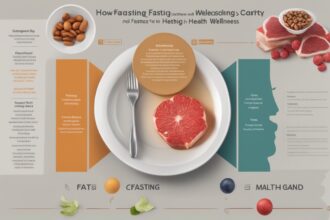Have you ever felt like your mind is clouded with distractions, unable to focus on the tasks at hand? In our fast-paced world, mental clarity often feels like a distant dream. But what if I told you that a simple practice like fasting could be the key to unlocking sharper focus and enhanced cognitive function? Fasting, often associated with weight loss or spiritual growth, is gaining attention for its remarkable impact on brain health. Specifically, the cognitive fasting benefits are becoming a hot topic among health enthusiasts and researchers alike. In this post, we’ll dive deep into how fasting can clear mental fog, improve memory, and even protect your brain from age-related decline. Stick with me as we explore the science, practical tips, and real-world applications of fasting for mental clarity.
What Are Cognitive Fasting Benefits?
Let’s start by breaking down what I mean by cognitive fasting benefits. Simply put, these are the positive effects that fasting—whether intermittent fasting, time-restricted eating, or extended fasts—has on your brain’s performance. Fasting isn’t just about skipping meals; it’s a metabolic switch that triggers processes in your body and brain that enhance mental sharpness. Studies suggest that fasting can improve focus, boost memory retention, and even foster creativity by reducing inflammation and promoting cellular repair (Mattson et al., 2018). When you fast, your body shifts from using glucose as its primary energy source to burning ketones, a type of fuel produced from fat. This metabolic state, known as ketosis, is linked to improved brain function and reduced mental fatigue. So, if you’ve been searching for natural ways to enhance brain health, fasting might just be your answer.
How Fasting Boosts Mental Clarity
One of the standout cognitive fasting benefits
Fasting and Memory Enhancement
Another exciting aspect of cognitive fasting benefits is the potential to improve memory. Whether you’re a student cramming for exams or a professional juggling multiple projects, memory plays a critical role in daily life. Fasting supports memory by increasing the production of brain-derived neurotrophic factor (BDNF), a protein that promotes the growth of new neurons and strengthens existing neural connections (Sleiman et al., 2016). Higher BDNF levels are associated with better learning and recall. Moreover, fasting reduces oxidative stress and inflammation in the brain, both of which are linked to memory decline and neurodegenerative diseases like Alzheimer’s. If you’ve ever struggled to remember names or details, incorporating fasting into your routine might help give your memory a much-needed boost.
Protecting Your Brain with Fasting
Beyond immediate mental clarity, fasting offers long-term protective effects for brain health, making it a powerful tool against age-related cognitive decline. As we age, our brains become more vulnerable to conditions like dementia and Parkinson’s disease. Fasting’s ability to reduce inflammation, enhance autophagy, and improve mitochondrial function helps safeguard the brain from these risks (Mattson et al., 2017). Studies in animals have shown that intermittent fasting can delay the onset of neurodegenerative diseases by supporting neural resilience (Halagappa et al., 2007). While more human studies are needed, the early evidence is promising. By tapping into these cognitive fasting benefits, you’re not just sharpening your mind today—you’re investing in its health for years to come.
Practical Tips to Maximize Cognitive Benefits Through Fasting
Now that we’ve covered the science behind cognitive fasting benefits, let’s get into how you can apply this in your life. Fasting doesn’t have to be intimidating, and you don’t need to jump into a week-long fast to see results. Here are some actionable tips to help you harness fasting for mental clarity and brain health:
- Start with intermittent fasting (IF): Try the 16:8 method, where you fast for 16 hours and eat during an 8-hour window. This is beginner-friendly and still offers cognitive perks.
- Stay hydrated: Dehydration can worsen mental fog, so drink plenty of water, herbal teas, or black coffee during fasting periods.
- Avoid overeating during eating windows: Focus on nutrient-dense foods like vegetables, healthy fats, and lean proteins to support brain health without undoing fasting benefits.
- Time your fasts for productivity: If you’re new to fasting, schedule your fasting window during less demanding hours to ease the transition.
Common Challenges and How to Overcome Them
While the cognitive fasting benefits are impressive, fasting isn’t always a walk in the park. Some people experience hurdles, especially when starting out. Let’s address a few common challenges and how to navigate them so you can stay on track with your brain-boosting journey:
- Hunger pangs: These are normal at first. Distract yourself with light activities or drink water to curb cravings. Hunger often subsides after a few days as your body adjusts.
- Low energy: If you feel sluggish, ensure you’re getting enough electrolytes (like sodium and potassium) and consider shortening your fasting window until your body adapts.
- Irritability: Mood swings can happen due to blood sugar fluctuations. Ease into fasting gradually and prioritize sleep to stabilize your mood.
- Social pressures: Eating is often a social activity. Communicate your goals with friends and family, or plan fasting around social events to avoid feeling left out.
Remember, fasting is highly personal. What works for one person may not work for another, so listen to your body and adjust as needed. If you have underlying health conditions or are pregnant, consult a healthcare provider before starting any fasting regimen. The goal is to enhance your mental clarity, not to stress yourself out.
In wrapping up, it’s clear that the cognitive fasting benefits offer a compelling reason to explore this ancient practice in a modern context. From sharpening focus and enhancing memory to protecting your brain against aging, fasting is more than a diet trend—it’s a lifestyle tool for mental wellness. The science is still evolving, but the evidence so far points to fasting as a natural, accessible way to boost brain health. Whether you’re new to fasting or a seasoned pro, start small, stay consistent, and pay attention to how your mind responds. Have you tried fasting for mental clarity? I’d love to hear your experiences or any tips you’ve picked up along the way. Let’s keep the conversation going and support each other in achieving a clearer, sharper mind!
References
- Cahill, G. F. (2006). Fuel metabolism in starvation. Annual Review of Nutrition, 26, 1-22. https://doi.org/10.1146/annurev.nutr.26.061505.111258
- Neurobiology of Disease, 26(1), 212-220. https://doi.org/10.1016/j.nbd.2006.12.019
- Longo, V. D., & Mattson, M. P. (2014). Fasting: Molecular mechanisms and clinical applications. Cell Metabolism, 19(2), 181-192. https://doi.org/10.1016/j.cmet.2013.12.008
- Mattson, M. P., Longo, V. D., & Harvie, M. (2017). Impact of intermittent fasting on health and disease processes. Ageing Research Reviews, 39, 46-58. https://doi.org/10.1016/j.arr.2016.10.005
- Mattson, M. P., Moehl, K., Ghena, N., Schmaedick, M., & Cheng, A. (2018). Intermittent metabolic switching, neuroplasticity and brain health. Nature Reviews Neuroscience, 19(2), 63-80. https://doi.org/10.1038/nrn.2017.156
- Sleiman, S. F., Henry, J., Al-Haddad, R., El Hayek, L., Abou Haidar, E., Stringer, T., … & Chao, M. V. (2016). Exercise promotes the expression of brain derived neurotrophic factor (BDNF) through the action of the ketone body β-hydroxybutyrate. eLife, 5, e15092. https://doi.org/10.7554/eLife.15092






